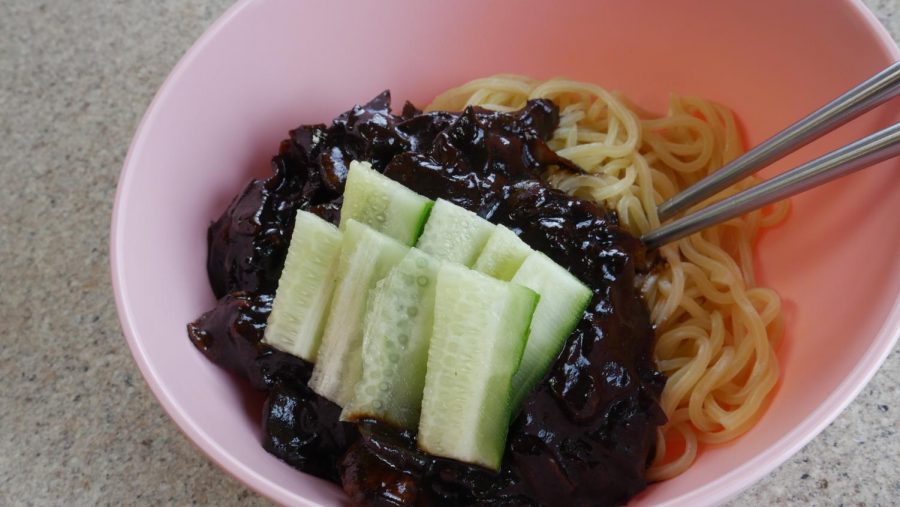Jjajangmyeon and Black Day – finally something for us single people
Couples may have heart-shaped boxes of chocolates, but we singles have streaming hot bowls of black bean noodles. So who’s really winning?
April 19, 2021
February 14 – a day when couples celebrate their love for each other. This is perfectly fine and dandy, but what about all of the single people out there? As a seemingly eternally single person myself, I have no use for St. Valentine’s Day.
Now, Black Day, on the other hand, is a holiday that I can embrace! Have no clue what I’m talking about? Let me explain.
Black Day, or 블랙데이, is an unofficial Korean holiday celebrated on April 14. It is essentially the antithesis of Valentine’s Day and another Korean holiday called White Day.
South Korea – a country teeming with couple culture. The home of K-pop and K-drama is hands-down a place for lovers. Matching outfits, referred to as “couples looks,” are used as means of declaring love. Anniversaries are celebrated in 100-day increments. Sharing a dish with a significant other is such a big deal, that some restaurants have turned away single diners. In a nation so in love with love, it is to be expended that romantic holidays would hold tremendous value. This is why Korea celebrates two well-known romantic holidays – Valentines Day and White Day.
Valentine’s Day in Korea differs slightly from the one we Americans are accustomed to. To us, this day revolves around women and men exchanging gifts as a way of showing their love for each other. In South Korea, on the other hand, Valentine’s Day is an occasion where women give gifts to their significant others or crushes.
Now, don’t get worked up too quickly. The men do reciprocate the gesture! That is where White Day swoops in. In South Korea, White Day is celebrated exactly one month after Valentine’s Day – on March 14. On this day, the men are now responsible for giving women gifts.
So what exactly is Black Day, and what does it have to do with all of this mushy, lovey-dovey stuff?
Well, Black Day is a holiday for singles. We individuals without romantic partners deserve a holiday too! What may have originated as a day for single people to lament their lack of romance and drown their sorrows in comfort food, has morphed into something akin to a real holiday. Now, many singles celebrate their singleness by indulging in jjajangmyeon (짜장면).
Jjajangmyeon, a food that can be spotted in an abundance of K-dramas and variety shows, is a Korean noodle dish that traces its origins back to a Chinese dish called Zha Jiang Mian. Way back when, in late 19th century Korea, as some Chinese immigrants began to settle in Incheon, Chinese restaurants began to appear. A restaurant called Gonghwachun, which opened in 1905, is credited as the originator of jjajangmyeon, a dish based on one from China’s Shandong region. This non-spicy food is composed of thick wheat noodles and a sauce made from a thick black bean paste, stir fried with diced pork and veggies, like cabbage and onions.
Jjajangyeon, also spelled jajangmyeon, has become a cheap and convenient food, frequently enjoyed by Koreans. Maybe that, in conjunction with its almost black color, is what makes this noodle dish such a popular food to consume for Black Day – along with black coffee.
I am not Korean and have absolutely no ties to the culture, that, however, has not stopped me from falling in love with it. I stumbled upon my first ever Kpop song, two or three years ago. Things have been evolving since then. That first song led me to discover more songs, artists, and groups. I wasn’t satisfied with just that. I needed to know about the culture responsible for songs that were quickly taking over my playlist. So, it’s only natural that, as a single, Korean culture-loving, college student with little to no social life, when I realized Black Day was steadily approaching, I decided that there was no better time than the present to try my hand at cooking jjajangmyeon for the first time! So that is exactly how I found myself preparing this noodle dish at 1 a.m. on a Wednesday.
The following recipe comes to you courtesy of Kimchimari.com.
INSTRUCTIONS
Servings: 3 Cooking Time: 35 min Difficulty: Medium
Ingredients
- 1 pack of noodles
- 1/2 cup Chinese black bean paste (춘장 chunjang/choonjang)
- 1/3 cup vegetable oil (for sauteeing chunjang)
- 3 Tbsp vegetable oil (for sauteing veg)
- 1/2 cup or 3 fresh, dried, or fresh shiitake mushrooms, chopped (optional)
- 3 oz (80g) pork loin, cut into cubes
- 1 medium-size onion, chopped
- 1 1/2 cup cabbage, chopped
- 1/2 cup zucchini, chopped
- 1 carrot, chopped (optional)
- 2 green onions, chopped
- 1/2 cucumber, julienned (as garnish)
- 1 Tbsp sugar
- 1 cup water
- Cornstarch slurry – 1/4 cup water + 1 Tbsp cornstarch
- Begin by bringing a pot of water to a boil. Add your noodles, cooking according to the package’s directions.
- Prepare the meat and vegetables by chopping them into cubes.
- Add ½ cup of black bean paste and ⅓ cup of oil into a pan on medium/medium-high heat. Stir often. It should bubble. Cook for about 7 minutes. Remove the black bean paste from the pan and set aside, discarding the oil.
- In another pan, heat 2 Tbsp of oil over medium heat. Sauté the onions and cabbage for 10 minutes, or until the onions become translucent. Remove and set aside.
- In the same pan, cook pork on medium-high heat for 2 – 3 minutes.
- Return the cabbage and onions to the pan with the pork. Add in 1 Tbsp of oil and the remaining vegetables. Cook over medium-high heat for 5 – 7 minutes. The vegetables should remain slightly crunchy.
- Add the cooked black bean paste to the pan. Stir so that the paste coats the vegetable/pork mix evenly.
- Stir fry for 2 minutes. Add 1 cup of water and 1 Tbsp of sugar. Stir well. Simmer for 3 – 4 minutes.
- Add cornstarch slurry, stirring for 2 – 3 minutes. The sauce is ready when it is a slightly thicker consistency than gravy.
- Serve over noodles with a cucumber garnish and enjoy.


